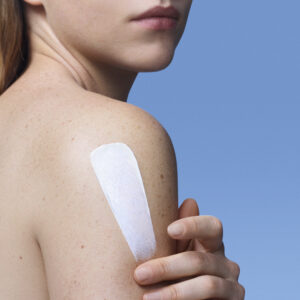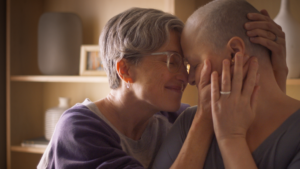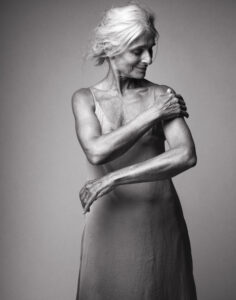La Roche-Posay is the official sponsor of World Cancer Day. Here’s how the world-renowned skincare brand continues to fight with care.

Image Credit: La-Roche Posay
World Cancer Day is coming up on Saturday, February 4th. This year, La Roche-Posay is breaking boundaries as an official sponsor of World Cancer Day and the only skincare brand to partner with the Union for International Cancer Control (UICC). La Roche-Posay is the number one dermatologist-recommended brand in Canada and has been an industry leader in helping fight cancer with care. For 25 years, the brand continues to promote breakthrough clinical research, work alongside professional oncologists and dermatologists, and formulate life-changing skincare solutions that help improve patient’s quality of life as well as through the La Roche-Posay Thermal Centre in France.
This World Cancer Day, La Roche-Posay is championing being a leader for change in helping others raise awareness surrounding the skin toxicities of cancer treatments in addition to recognizing the significance of supportive care. In Canada, the brand supports 41,000 patients through the Canadian Cancer Society and is actively searching for opportunities to connect and help patients undergoing treatments.
Today, HOLR is breaking down La Roche-Posay’s life-changing mission. We are also chatting with Dr. Tarek Hijal, Oncologist and head of the McGill University Health Centre Department of Radiation Oncology, about World Cancer Day in relation to supportive care for cancer patients, skin side effects experienced during treatments, and how to raise awareness about skin toxicities.
La Roche-Posay Fights with Care this World Cancer Day
Did you know that 80% of cancer patients suffer from harsh skin side effects of their treatments*, which can lead to temporary or permanent discontinuation of their therapy?
As the official sponsor and the only skincare brand to partner with the UICC, La Roche-Posay is demonstrating how it is continuing to fight with care this World Cancer Day. Fight With Care is an international program with the goal to raise awareness and train healthcare professionals to better fight the skin side effects of cancer treatments. This not only ensures a better quality of life during cancer diagnosis but also promotes better chances of healing. It also includes support from La Roche-Posay to patients’ associations worldwide- including product donations and financial contributions.
La Roche-Posay is an innovative brand that wants to change the conversation surrounding cancer and skincare by advocating for increased education surrounding skin toxicities that come about as a result of exposure to cancer treatments. As well, the brand is looking to help others recognize the significance of supportive care.
As a result, La Roche-Posay developed a Practical Guide which features a culmination of expert advice to help patients to find answers to the many questions related to skincare, before, during, and after Treatments. In addition, the brand is committed to providing skincare solutions by formulating products designed to improve cancer patients’ quality of life.

Image Credit: La-Roche Posay
HOLR Chats with Dr. Tarek Hijal
In recognizing La Roche-Posay’s commitment to fighting with care this World Cancer Day, HOLR sat down with Dr. Tarek Hijal to learn more about the importance of supportive care, the skin side effects of treatments, and how we can collectively raise awareness regarding the harmfulness of skin toxicities.
Can you talk to us about the significance of World Cancer Day?
World Cancer Day is an international day marked on February 4th to raise awareness and education about the prevention, diagnosis, and treatment of cancer. With cancer being one the most important global killers, it is extremely pertinent to work on a global level to inform about how to prevent, diagnose and treat this disease.
As a professional in the space, how important is supportive care for cancer patients?
The care of patients with cancer has to be multi-dimensional. We first aim to improve oncologic outcomes – reduce the risk of cancer recurring. It is nonetheless important to do that while reducing the immediate and long-term side effects to a minimum. We will use different strategies to support patients throughout their treatments, which can include physical and psychological support as well as medications.
Can you tell us more about the skin side effects individuals might experience during treatments?
Radiation can impact the skin in many ways: During treatment or immediately after treatment, the skin can become red, itchy, and peel off. We call this radiation dermatitis. In the long term, it can change tone, and become lighter or darker, and less elastic. For patients undergoing chemotherapy, the skin changes will depend largely on the type of chemotherapy or immunotherapy drug they’re receiving. The most typical side effects are:
– Hair loss
– Dry skin
– Itchy skin
– Changes in the pigmentation of the skin
– Inflammation of the skin
– Changes to the nails
– Acne-like rashes
Most of these changes start with chemotherapy and last until chemotherapy is stopped. In the case of immunotherapy and with certain chemotherapeutic agents, changes can last several weeks after the discontinuation of treatment.

Image Credit: La-Roche Posay
When it comes to raising awareness about skin toxicities, how can we go about doing this?
There are many ways of raising awareness about skin toxicities, and ideally, it should be done in a multi-pronged fashion. First and foremost, it is important that clinicians (healthcare team) be educated about the different skin toxicities and the different ways to decrease them. The treating team should also educate patients about skin toxicities. They should make sure patients are aware of the possible side effects and of the preventive measures and treatments that can be used to reduce side effects.
For more information regarding how La Roche-Posay is fighting with care this World Cancer Day, please visit the brand’s website here to learn more about La Roche-Posay’s oncology commitments.
Published by HOLR Magazine.
*Charles C, et al. Impact of cutaneous toxicity associated with targeted therapies on quality of life. Results of a longitudinal exploratory study. Bulletin du Cancer. March 2013;100(3):213-22.


